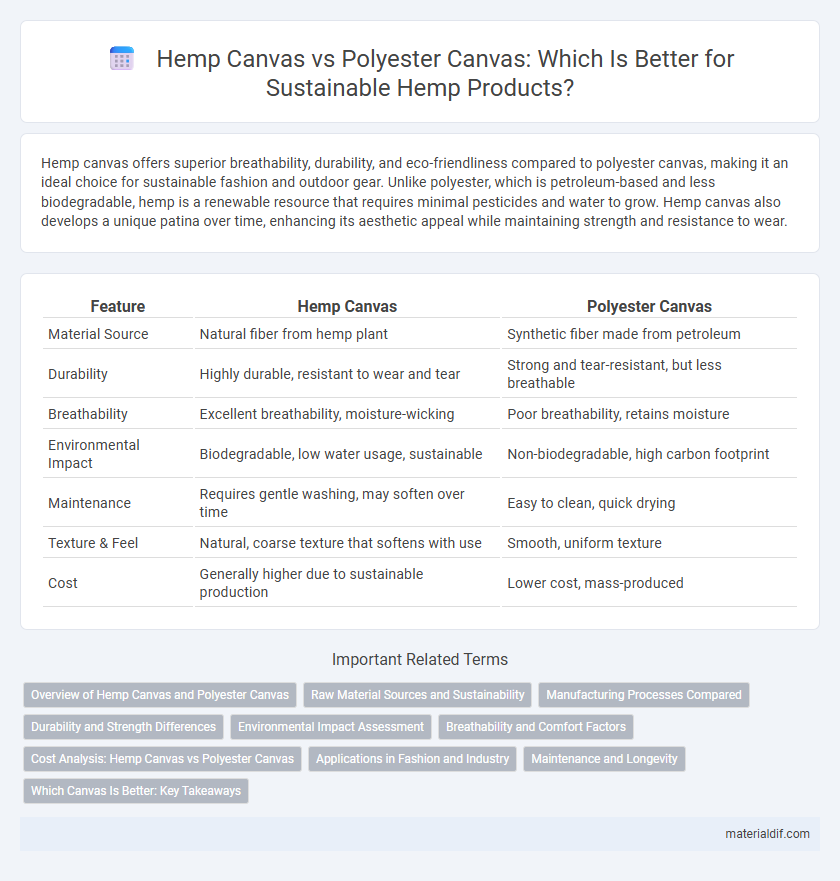Hemp canvas offers superior breathability, durability, and eco-friendliness compared to polyester canvas, making it an ideal choice for sustainable fashion and outdoor gear. Unlike polyester, which is petroleum-based and less biodegradable, hemp is a renewable resource that requires minimal pesticides and water to grow. Hemp canvas also develops a unique patina over time, enhancing its aesthetic appeal while maintaining strength and resistance to wear.
Table of Comparison
| Feature | Hemp Canvas | Polyester Canvas |
|---|---|---|
| Material Source | Natural fiber from hemp plant | Synthetic fiber made from petroleum |
| Durability | Highly durable, resistant to wear and tear | Strong and tear-resistant, but less breathable |
| Breathability | Excellent breathability, moisture-wicking | Poor breathability, retains moisture |
| Environmental Impact | Biodegradable, low water usage, sustainable | Non-biodegradable, high carbon footprint |
| Maintenance | Requires gentle washing, may soften over time | Easy to clean, quick drying |
| Texture & Feel | Natural, coarse texture that softens with use | Smooth, uniform texture |
| Cost | Generally higher due to sustainable production | Lower cost, mass-produced |
Overview of Hemp Canvas and Polyester Canvas
Hemp canvas is a durable, eco-friendly fabric made from hemp fibers, known for its natural resistance to mold, UV damage, and wear, making it ideal for sustainable fashion and outdoor gear. Polyester canvas, crafted from synthetic fibers, offers high tensile strength, water resistance, and quick-drying properties, widely used in industrial applications and weatherproof products. Comparing the two, hemp canvas provides better biodegradability and breathability, while polyester excels in longevity and moisture repellence.
Raw Material Sources and Sustainability
Hemp canvas is derived from the fibers of the Cannabis sativa plant, a fast-growing, renewable resource that requires minimal water and no pesticides, making it highly sustainable. Polyester canvas, made from synthetic polymers derived from petroleum, depends on finite fossil fuels and involves energy-intensive production processes that contribute to environmental pollution. The natural biodegradability of hemp contrasts with the long-lasting microplastic pollution caused by polyester, positioning hemp canvas as a more eco-friendly choice for sustainable textiles.
Manufacturing Processes Compared
Hemp canvas manufacturing involves natural fiber extraction through retting and decortication, followed by spinning and weaving, resulting in a durable, eco-friendly fabric with minimal chemical use. Polyester canvas production relies on synthetic polymerization, melting, and extrusion processes, which demand higher energy consumption and emit more greenhouse gases. The natural biodegradability and lower environmental impact of hemp canvas contrast with the petroleum-based, non-biodegradable nature of polyester canvas materials.
Durability and Strength Differences
Hemp canvas is renowned for its exceptional durability, offering higher tensile strength and better resistance to abrasion compared to polyester canvas. While polyester is a synthetic material that resists stretching and shrinking, hemp's natural fibers provide superior breathability and long-lasting toughness, making it ideal for heavy-duty applications. The biodegradability of hemp canvas also adds an eco-friendly advantage without compromising its structural integrity.
Environmental Impact Assessment
Hemp canvas significantly reduces environmental impact compared to polyester canvas due to its biodegradability and lower carbon footprint during production. Hemp cultivation requires minimal pesticides and water, promoting soil health and biodiversity, whereas polyester relies on petroleum-based processes that emit greenhouse gases and contribute to pollution. Lifecycle assessments highlight hemp canvas as a sustainable alternative with superior ecological benefits in textile manufacturing.
Breathability and Comfort Factors
Hemp canvas offers superior breathability compared to polyester canvas due to its natural fiber structure, which allows better air circulation and moisture wicking. This results in enhanced comfort, especially in warm and humid conditions, making hemp ideal for garments and bags requiring ventilation. Polyester canvas, being synthetic, tends to trap heat and moisture, reducing overall comfort during prolonged use.
Cost Analysis: Hemp Canvas vs Polyester Canvas
Hemp canvas generally has a higher initial cost compared to polyester canvas due to sustainable farming and eco-friendly processing methods, but it offers superior durability and biodegradability that reduce long-term replacement expenses. Polyester canvas, while more affordable upfront, often entails higher environmental costs and shorter lifespan, leading to increased sustainability expenses over time. Choosing hemp canvas supports eco-friendly investment despite the premium price, aligning cost analysis with environmental and durability benefits.
Applications in Fashion and Industry
Hemp canvas offers superior durability, breathability, and eco-friendliness compared to polyester canvas, making it ideal for sustainable fashion products such as bags, shoes, and outerwear. Its natural resistance to UV light and mold enhances performance in outdoor and industrial applications, including tarps, tents, and upholstery. Polyester canvas, while more affordable and water-resistant, lacks the biodegradability and environmental benefits that hemp canvas provides, limiting its appeal to eco-conscious consumers and industries.
Maintenance and Longevity
Hemp canvas offers superior durability and resists wear, maintaining its strength and texture over time with minimal maintenance, unlike polyester canvas which can degrade and pill under frequent use. Hemp's natural fibers are resistant to mildew and UV damage, enhancing longevity in outdoor conditions, while polyester often requires specialized cleaning agents to preserve its appearance. The breathable quality of hemp canvas also reduces the accumulation of dirt and odors, making upkeep easier and extending the lifespan of products made from it.
Which Canvas Is Better: Key Takeaways
Hemp canvas offers superior durability, breathability, and environmental benefits compared to polyester canvas, as it is naturally resistant to mold and UV damage while being biodegradable. Polyester canvas excels in water resistance and affordability but lacks the sustainability and long-term strength of hemp. Choosing hemp canvas supports eco-friendly manufacturing and ensures a sturdy, long-lasting material ideal for heavy-duty applications.
hemp canvas vs polyester canvas Infographic

 materialdif.com
materialdif.com